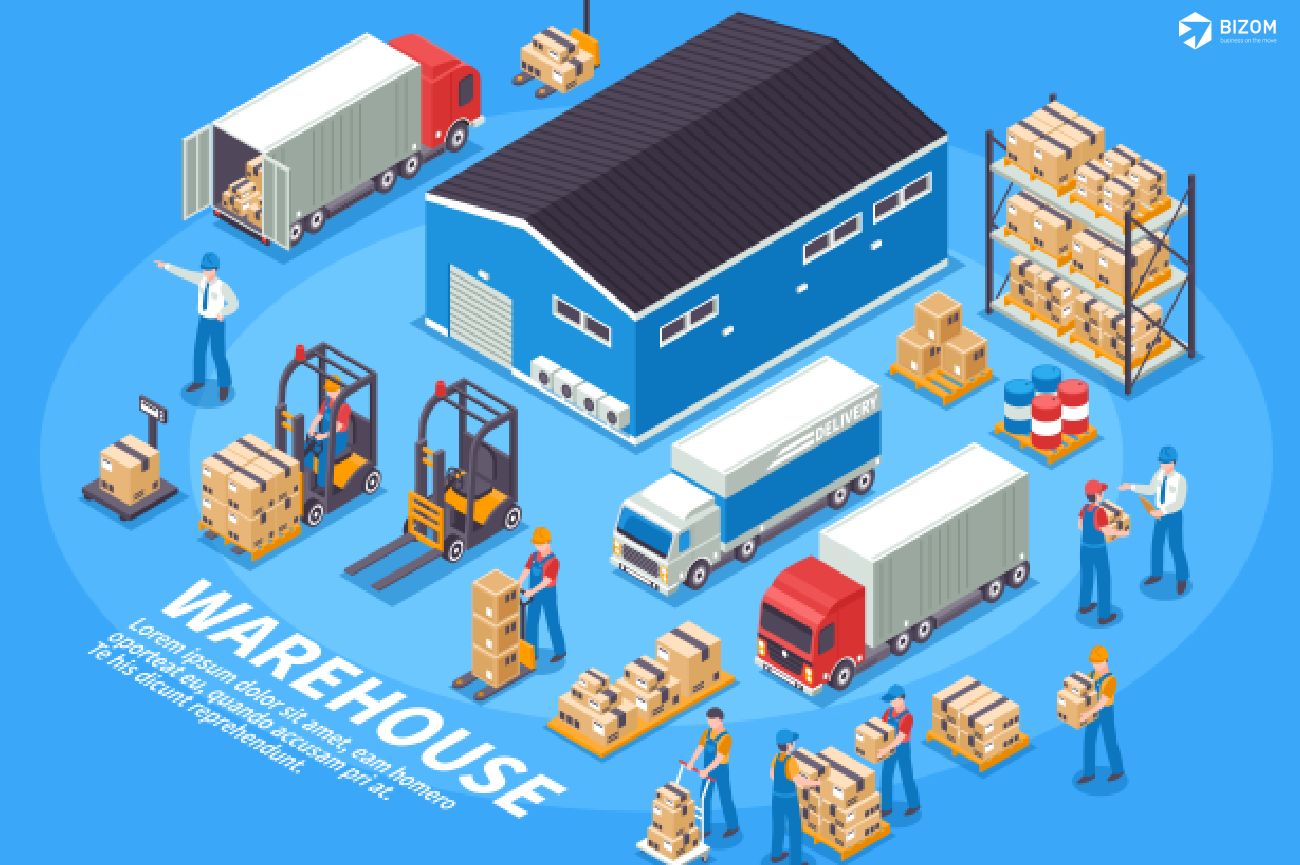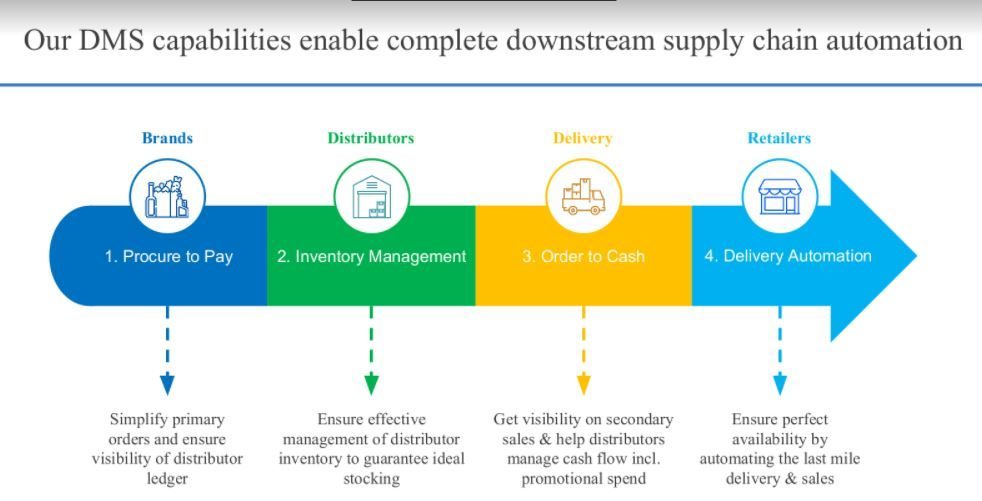Why Online, Mobile-First DMS Might be the Best Bet for Indian FMCG Companies
by Mansi Srivastava
Share:

Studies show that top FMCG companies currently spend between 10-15% of their sales turnover on distribution. The high cost of distribution makes it a significant entry barrier for new entrants in the hyper-competitive FMCG space and a huge competitive advantage for the companies that get it right.
Studies are also unanimous in concluding that automation, through a distributor management system (DMS), is critical to optimizing FMCG distribution for medium and large FMCG companies. A good distributor management system automates and streamlines all distribution workflows and activities, improves supply chain efficiency, eliminates stockouts and overstocking and allows companies to access real-time data from distributors.
The last point – access to timely data – is, in fact, the key benefit of DMSes for the FMCG industry where capital and information must constantly move in both directions: credit and information about products, schemes, and stock from manufacturers to channel partners; payments and information about sales, inventory, returns and claims back from retailers and distributors to manufacturers.
As a recent IIMB report put it, “The distribution channel is powerful for demand activation because the way you set up your distribution channel, the way you interact with small retailers in the absence of mass media is very important.” Clearly, better data = better business.
However, many FMCG sales heads and CIOs we spoke to in the course of developing Bizom’s DMS product were not as enthusiastic about their existing DMS.
“We already have a DMS but it’s not used by the majority of our distributors,” and “We implemented DMS a few years back but we did not see a good return on investment,” were some of the statements we heard. This obvious mismatch between DMS products available in the market and customer needs to force us to look more closely at the distribution ecosystem our clients work in.
IT HAPPENS ONLY IN INDIA
We started by looking at the uniquely Indian distribution challenges that FMCG companies here face. We found that:
- Retailing and wholesaling in India are dominated by small, unorganized entities – distributors are usually sole proprietors or family businesses.
- Many distributors have limited financial resources and real estate.
- Multi-brand distributors are common.
- Some distributors lack the capital, hardware and expertise to use technology.
- Discomfort with technology results in a lack of real-time data on orders, inventory, claims and returns leading to stockouts or overstocking.
- The pressure to reach far-flung rural areas makes it necessary to have several levels in the distribution chain, adding cost and inefficiency.
Some of these characteristics can be traced to limiting factors in the business environment – limited penetration of the Internet, a substandard logistics infrastructure, and poor implementation of laws and regulations. To complicate things further, India has a large base-of-pyramid (BOP) and rural markets which present distinct challenges for distribution.
The good news is that some of these factors are undergoing rapid change in response to fundamental changes in the tax and regulatory environment. The implementation of the Goods and Services tax (GST) is nudging unorganized players to become more lean, transparent and structured. Also, the move towards a more unified domestic market is reducing the complexity of the distribution network by eliminating the need to have warehouses in every state.
However, many challenges still remain in optimizing distribution. Brands must still manage a vast network of thousands of big and small retailers and wholesalers spread out across the length and breadth of the country. They need to juggle the often conflicting needs of different channel partners with limited data and insight into the market. This is where technology comes in.

DISTRIBUTOR MANAGEMENT SYSTEMS (DMS)
Many big and small FMCG brands are now aware of the transformative power of technology and data-drive decision making and have tried to automate primary and secondary sales through a distributor management system, or DMS, either as part of an end-to-end ERP project or as a stand-alone system. These systems typically automate a range of distributor management workflows including:
- Channel management
- Inventory management
- Primary order and billing
- Secondary order booking
- Distributor claims management
- Generation of reports and dashboards
- Purchase order management
- Master data management
- Order fulfilment and sales return
- GRN generation and invoicing
- Pushing of schemes and discounts
- Collection and recording of bank transactions
- Operational efficiency for distributors
- Promotions creation
However, as we saw earlier, despite this impressive list of features and benefits, many companies have not seen these benefits delivered.
From our conversations with customers – some of whom had burnt their fingers with established, big-name DMS vendors – we identified three broad causes behind the failure of DMS implementations:
- Multi-brand FMCG distributors are reluctant to use different DMSes for different brands.
- Some distributors, especially sub-stockists in rural/semi-urban areas, struggle with unreliable electricity and internet connectivity, which prevents them from uploading data in a timely manner.
- Many small FMCG distributors don’t have the capital or the expertise/interest to buy and use computer hardware or complicated software.
We realized that many software products treated distributors as a homogenous group and did not take into account the vast differences between the various types of players.
Our research identified three distinct sub-groups of distributors:
- Substockist for rural markets and small distributors: They form half of the total group and the majority of these rural distributors have inadequate capital and tech infrastructure.
- Multibrand distributors: They form 20% of the group and are keen to avoid using multiple systems for the various brands they handle.
- Large distributors: The remaining 30%, have better access to capital and technology and demand actionable data and information.
It is clear from the research that a one-size-fits-all approach will not work to manage this network of stakeholders with diverse needs and unique features.
THE BIZOM DMS SOLUTION

To address this and to make their DMS better suited to the FMCG distribution ecosystem in India, Bizom, a leading sales workflow automation solutions provider for emerging markets, decided to offer three modes of their product to meet the distinct needs of each of the above sub-groups, thus ensuring that brands get complete visibility on their entire downstream supply chain.
1. Bizom Mobile DMS – For small distributors and those serving the rural market
This mode is best suited for distributors whose volumes are too small to warrant investing in computer hardware and for those with limited access to the internet and power. Such distributors can operate the DMS on mobile devices such as their phones. Bizom’s mobile-first approach for this subgroup is well-aligned with users’ preference for and comfort with using mobile phones.
Bizom Mobile DMS is also suitable for brands who have a huge number of distributors and will therefore find it too expensive and cumbersome to deploy systems for every distributor.
Bizom’s robust offline capabilities facilitate quick syncing of data with the online system whenever the internet is available, solving the problem of latency in receiving information from rural distributors/substockists. In addition, the simple and intuitive UI of the system drives adoption even among those who are not accustomed to using technology.
2. Bizom DMS Connect – For multi-brand distributors
Multi-brand distributors cannot afford to use multiple systems for their operations, so Bizom Connect draws a brand’s data directly from the distributors’ billing system. This offers brands visibility without compromising their relationship with their distributors.
3. Bizom Online DMS – For large distributors
Larger distributors who have better technology infrastructure can gain the full range of benefits of online DMS in this mode. The online DMS provides real-time inventory reports, alerts, promotion utilization and fill-rate data to the brand, while also simplifying the management of receivables, deliveries and trip sheets.
THE SAAS-Y CHOICE
In addition, all three modes offer the benefits of using a cutting edge SaaS, cloud-based solution rather than on-premise software:
| BIZOM ONLINE, MOBILE-FIRST DMS | LEGACY ON-PREM MODEL DMS (BOTREE, SIFY) |
|---|---|
| Low initial investment | High upfront investment for initial setup |
| Quick go-live time of 2 weeks | Long implementation period of several weeks/months |
| Integrated Solution with SFA + DMS + Retailer App + Business Intelligence | Only DMS, with expensive and time-consuming integration with other products |
| Easy to use application (designed for use without training by a paanchvi-paas person) | Expensive, time-consuming training and support |
| Expert consulting and training services | Additional support only at heavy additional cost |
| KPI-based evangelization services to drive usage | Usage must be driven by management |
| Flexible pay as you grow pricing option, simple contract and renewal terms: Customer can opt out easily | High one-time licensing fee: Customer is locked in to the platform and exit is difficult and expensive |
| Upgrades and feature enhancements free of cost for lifetime | Static installation that gets outdated quickly and must be updated by the customer at additional cost |
| Cloud Infrastructure need not be planned for peak load/growth; utilization is always efficient | Infrastructure needs to accommodate peak load/growth; utilization is sub-optimal |
| Zero down time in the last 24 months; disaster recovery in place at no extra cost | Business continuity/disaster recovery needs to be planned |
| Integrations can be done quickly with standard APIs in half the time as on-premise | Integration complexity is very high: every additional requirement is a customization at additional cost and timelines |
| Standard and published APIs | No standard and published APIs |
| Access to cutting edge innovations like Bizom Arena, gamification of sales, and patented image recognition tool 35 hawk for merchandising automation | No proactive product improvements; any change is only specific to the client, hence no cross leverage of feature/functionality |
| Bizom is built as an agile platform and it can make customizations quickly and easily via configuration | Every additional requirement is a product level customization at additional cost and long timelines |
| Platform approach allows quick configuration: Bizom DMs deployed pan India in under 6 months with clients like Gowardhan, Ramdev Food Products, and HRI | Implementations at several large manufacturers are not deployed pan India despite extended timelines |
Benefits for Distributors
Distributors derive the following benefits from Bizom DMS:
1. Improved Inventory management:
– Automated alerts to avoid stock outs
– Ideal stocking based on sale patterns
– Salable and non-salable returns management
2. Visibility on primary fill rate:
– Know availability of stock at warehouse
– Get Information on in-transit stock and delivery date
3. Quicker processing of claims:
– Eliminate the need for shipping paper bills
– Automated compiling of secondary scheme claims
– Quicker processing of claims owing to digital data
4. Credit management:
– Distributors can manage sales ledgers of the retails
– Manage credit allowances
– Track bank transactions
Last but not the least, Bizom offers a one-stop solution with seamless integration between Bizom’s sales force automation (SFA), retail execution & merchandising applications, and cutting-edge analytics. Such integration allows brands a 360-degree view of their downstream supply chain and delivers actionable insights based on data, not guesswork.
To get the Bizom online, mobile-first DMS advantage, reach out to our sales team at marketing@mobisy.com.
What challenges are you facing in managing your distribution network? What is holding you back from achieving success in channel management and sales? Write to us and let us know so we can build solutions together.



